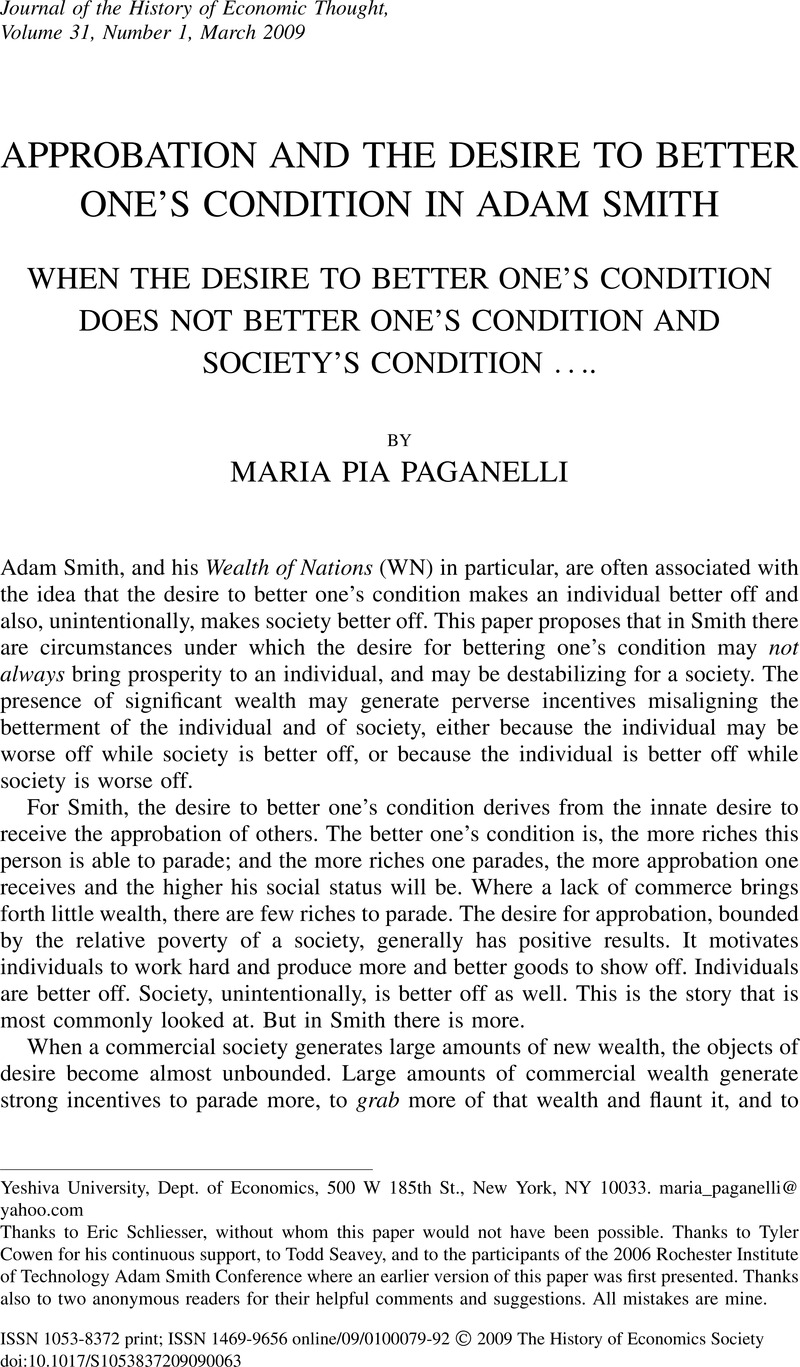Crossref Citations
This article has been cited by the following publications. This list is generated based on data provided by Crossref.
Chavanne, David
McCabe, Kevin
and
Paganelli, Maria Pia
2011.
Whose money is it anyway? Ingroups and distributive behavior.
Journal of Economic Behavior & Organization,
Vol. 77,
Issue. 1,
p.
31.
FAITH, ROSAMOND
SCHOFIELD, P. R.
HEALEY, JONATHAN
MURPHY, ANNE L.
BRADLEY, KATE
TAYLOR, JAMES
and
BROWNLOW, GRAHAM
2011.
Review of periodical literature published in 2009.
The Economic History Review,
Vol. 64,
Issue. 1,
p.
256.
Paganelli, Maria Pia
2011.
The same face of the two Smiths: Adam Smith and Vernon Smith.
Journal of Economic Behavior & Organization,
Vol. 78,
Issue. 3,
p.
246.
Paganelli, Maria Pia
2012.
Economies in transition and in development: A possible warning from Adam Smith.
The European Journal of the History of Economic Thought,
Vol. 19,
Issue. 2,
p.
149.
Smith, Craig
2016.
All in the best possible taste: Adam Smith and the leaders of fashion.
The European Journal of the History of Economic Thought,
Vol. 23,
Issue. 4,
p.
597.
Menudo, José M.
and
Rieucau, Nicolas
2017.
A Previously Unpublished Correspondence between Adam Smith and Joseph Nicolas de Windischgrätz.
History of Political Economy,
Vol. 49,
Issue. 1,
p.
93.
Brady, Michael Emmett
2018.
On Smith's Rejection of Laissez Faire ''And the Magical Working of Markets Guided by the Invisible Hand ': The 'Malign' Impact of Projectors, Prodigals and Imprudent Risk Takers on the Sober People in the Macro Economy.
SSRN Electronic Journal ,
Wisman, Jon D
2019.
Adam Smith and Thorstein Veblen on the Pursuit of Status Through Consumption versus Work.
Cambridge Journal of Economics,
Vol. 43,
Issue. 1,
p.
17.
Rassekh, Farhad
2019.
Two Intellectual Landmarks in the Year 1749.
Journal of Scottish Philosophy,
Vol. 17,
Issue. 2,
p.
101.
Gioia, Vitantonio
2020.
From “prudent man” to homo oeconomicus: Does historicity matter for the category of individualism?.
International Review of Economics,
Vol. 67,
Issue. 1,
p.
47.
Bridel, Pascal
2021.
Sismondi’s Price Theory.
History of Political Economy,
Vol. 53,
Issue. 4,
p.
697.
Malloy, Robin Paul
2021.
Law and the Invisible Hand.
Özler, Şule
2022.
The Paradox of Wealth and Happiness in Adam Smith’sThe Theory of Moral Sentiments.
Journal of Scottish Philosophy,
Vol. 20,
Issue. 3,
p.
203.
Hurtado, Jimena
and
Paganelli, Maria Pia
2022.
Diamonds Are Not Forever: Adam Smith and Carl Menger on Value and Relative Status.
SSRN Electronic Journal ,
Paganelli, Maria Pia
2022.
Vanity and Luck in Adam Smith's Economic Growth.
History of Political Economy,
Vol. 54,
Issue. 5,
p.
859.
Santori, Paolo
2022.
IDLENESS AND THE VERY SPARING HAND OF GOD: THE INVISIBLE TIE BETWEEN HUME’SDIALOGUES CONCERNING NATURAL RELIGIONAND SMITH’SWEALTH OF NATIONS.
Journal of the History of Economic Thought,
Vol. 44,
Issue. 2,
p.
246.
Paganelli, Maria Pia
and
Simon, Fabrizio
2022.
CRIME AND PUNISHMENT: ADAM SMITH’S THEORY OF SENTIMENTAL LAW AND ECONOMICS.
Journal of the History of Economic Thought,
Vol. 44,
Issue. 2,
p.
268.
Elazar, Yiftah
2023.
ADAM SMITH AND THE WEALTH-WORSHIPPING SPECTATOR.
Journal of the History of Economic Thought,
Vol. 45,
Issue. 2,
p.
278.
Hurtado, Jimena
and
Paganelli, Maria Pia
2023.
Diamonds are not forever: Adam Smith and Carl Menger on value and relative status.
The Review of Austrian Economics,
Vol. 36,
Issue. 2,
p.
289.
Paganelli, Maria Pia
2023.
The Palgrave Handbook of Methodological Individualism.
p.
17.



